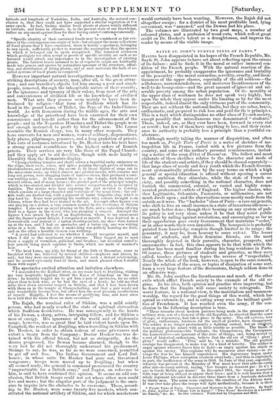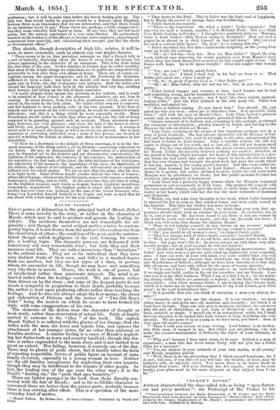BAYLE ST. JOHN'S PURPLE TINTS OF PARIS. * RAVING been disappointed
in his hopes of the French Republic, Mr. Bayle St. John appears to have set about reflecting upon the causes of its failure : and he finds it in the moral or rather immoral con- dition of the French people. With the natural reaction of dis- appointment, he probably exaggerates the ignorance and brutality of the peasantry—the moral cowardice, servility, cruelty, and licen- tiousness of the upper classes, especially of the old noblesse—the selfishness, narrowmindedness, and moreover licentiousness of the well-to-do bourgeoisie—and the great amount of ignorant and mi- serable poverty among the urban population. Of the morality of the upper class of workmen he does not speak very highly, but upon the whole they appear under his limning as by far the most respectable, indeed almost the only virtuous part of the community. They are not without the national faults, but they are sober, brave, enthusiastic, and prepared to risk loss and peril for their principles. This is a trait which distinguishes no other class of French society, except possibly that miscellaneous race denominated "students." These, indeed, are, as they ever have been, forward in every riot or revolt ; but few of them have anything to lose, and their resist- ance to authority is probably less a principle than a youthful ex- uberance.
Although mostly taking the manner of disquisition, and often too much so, Purple Tints of Paris is a series of sketches of me- tropolitan life in France, varied with a few pictures from the country, and some of the author's personal reminiscences, includ- ing a notice of the coup d'etat of December. The fullest and most elaborate of these sketches relates to the character and mode of life of the students and artists, if they should be classed separately— that large class of needy and fiery youth which the French Govern- ment systematically produces by the easy terms on which a high general or special education is offered without opening a career to the ambition they stimulate, while the state of French so- ciety, and possibly something in the national character, does not furnish the commercial, colonial, or varied and highly remu- nerated professional outlets of England. The higher classes, whe- ther Legitimists, Orleanists, Fusionists, or millionaires, are not much dwelt upon ; and the observations seem mostly made from the outside as it were. The " bachelor " class of Paris—a race sui generis, who shift to live on small incomes in a state of luxurious idleness— are much better done ; though their bearing on any system of pub- lic policy is not very clear, unless it be that they assist public turpitude by railing against revolutions, and encouraging as far as their approbation goes every Government that maintains "order," or in other words their own annuities. The bourgeoisie is probably painted from knowledge complete though limited in its range ; the peasantry, it may be, from hearsay to some extent. The looser class of students, and their feminine friends, are the most thoroughly depicted in their pursuits, character, prospects, and amusements : in fact, this class appears to be that with which the author has been most familiar during his long residence in Paris. Of course, these pictures of students and grisettes, as they were called, touches closely upon topics the reverse of "respectable." Nearly the whole of the book, however, is open to the same remark, since the relation of the sexes, or topics of dissipation of some sort, form a very large feature of the discussions, though seldom done in an offensive way. Mr. St. John ascribes the licentiousness and much of the other evils which afflict French society to the example of the old re- gime. In his idea, both opinion and practice were improving, but he fears that the Empire will cause society to retrograde. The worst feature, in a national view, is the materialism and mammon- worship, the regard for the good things of this world, which has spread so extensively, and is eating away even the brilliant quah- ties of Frenchmen. It has reached even the army, if the con- clusion in the following description is true.
"These remarks about modern painters being made in the presence of a military man, son of a General of the old Republic, he observed that the same change, or degeneracy, had taken place in the army. The old entrain, love of glory, enthusiasm, fondness for the smell of powder, have disappeared. The soldier is no longer preeminently a fighting animal, but an errmiloye, bent on gaining his salary with as little trouble as possible. The heads of the military profession—the Vaillants, the Chsngarniers, the Cavaignacs, the Lamoricieres—are ignorant of this state of things, and, being moved by a sort of historical enthusiasm, believe that the old cry of Glory ! glory ! glory!' would suffice. This,' said he, is a mistake. The old poetical courage has disappeared, to make way for a kind of ferocity. The soldier is angry against whoever forces him to fight—as angry against his chiefs as against the enemy. This explains why he massacres after victory—to re- venge the fear he has himself experienced. His degeneracy began under Louis Philippe, when corruption overtook everybody ; and thus is explared, in part, the inefficiency of the army in 1848. In June of that year, especially, whoever was present at the Ministry of War must know that aide-de-camp after aide-de-camp arrived, saying, 'Les troupes ne donnent pas : us n y a quo la Garde Mobile qui donne.' In December 1851, the troops maesacred with rage at being obliged to expose their lives ; and it is well known that a whole regiment retreated in disorder three times from a barricade defended by thirty men. The same cause explains the cruelties of the African wail+. If war ever take place the troops will fight methodically, because it is their * Purple Tints of Paris. Character and Manners in the New Empire. By Bole St. John, Author of "Village Life in Egypt," Two Years' Residence in a Levant- ine Family," &c. &c. In two volumes. Published by Chapman and Hall.
profession; but it will be some time before the heroic feeling gets up. The only war that would really be popular would be a descent upon England, because there is an impression that we are defenceless, and that there would be an immense booty to get.' These views are, perhaps, a little exaggerated; but they seem tolerably well based on facts. At any rate, they are not mere satire, but the serious conviction of a very calm thinker. He particularly insisted on the tendency of the officers to become mere employes, expecting ad- vancement from seniority, and calculating their receipts just like the clerks in Government offices."
This sketch, though descriptive of high life, relates, it will be seen, to mere externals, such as almost any one might observe.
"These seems to be an idea prevalent amongst us that a French lady is a sort of butterfly, fluttering about the house or away from the house, but always appearing in the character of an ornament. This is far from being the real state of the ease. So few families in France may be called wealthy, that most of the bright things we sometimes see in public are compelled very practically to look after their own affairs at home. There are, of course, ex- ceptions among the upper bourgeoisie, and in the Faubourg St. Germain, sufficient to form a class ; but what we should call mere fashionables are quite rare in Paris—the city of elegance and intrigue. Half the ladies who attend the Imperial balls have been in the kitchen that very day, scolding their bonnes, and lifting up the lids of their casseroles. "A really elegant dame spends the morning at her toilette, and is ready to be admired at four o'clock in the afternoon. Admirers are not long in coming. In many houses, from four to five, gentlemen call in, and are re- ceived in the salon by the lady alone. No visitor of her own sex is expected, and her husband is away making calls on his own account. If he were to remain and be present at his wife's reception, he would be considered simply ridiculous; and this is a thing which he most especially avoids. Many Frenchmen would rather be what they often are than run the risk of being supposed to be guarding against such an accident. These afternoon meet- ings, however, are very pleasant ; and when the lady of the house is clever and lively, are, perhaps, superior in enjoyment to the soirees. A woman is never seen to so much advantage as when no rivals are present. She is then conscious of exercising undivided sway ; none of her powers are wasted in spiteful watching for defects in others, and there is no maliciousness in her amiability. "If there be a drawback to the delight of these meetings, it is in the fre- quent presence of the thing called a fat in French,—answering somewhat to our dandy. He may be distinguished (if the observation of a philosopher may be depended on) by his decisive and yet disconnected conversation, the lightness of his judgments, the temerity of his censures, the indiscretion of his narratives, the bad taste of his jokes, the false brilliance of his witticisms, the affectation of his manners, the impudence of his mien, the familiarity of his address, the conceit of his attitude, and the self-satisfied air of constraint diffused over his whole person. We see at once that his mind, like his feet, is in tight boots. Some of these bright youths imitate the voice of women ; others affect lisping ; others avoid, like Orientals, names of ill-augury—as death, bankruptcy, duelling, and so forth. At the same time they are fond of using, on the slightest occasion, such words as despair, horror, frightful, monstrous, tremendous, magnificent. The highest the to which this lamentable ab- surdity has ever risen was, perhaps, in the case of the Count Dessarre, who, being very beautiful, fancied himself to be Cupid, and went so mad that he ran about with a bow and quiver for his only costume."

































 Previous page
Previous page